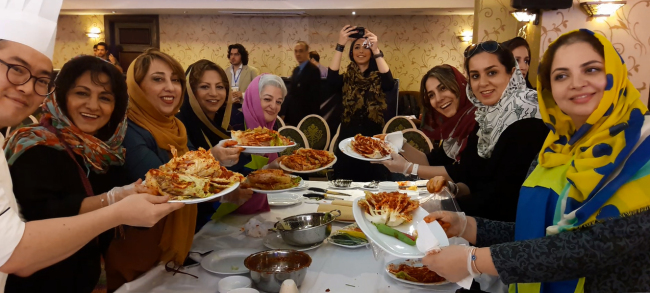Korea, Iran eye bigger trader in hallyu, health, welfare, IT
By Korea HeraldPublished : May 2, 2016 - 16:46
TEHRAN -- Despite the past diplomatic distance between Iran and South Korea, many Iranians consider themselves quite familiar with Korean culture, at least through what they see in popular TV dramas such as “Daejanggeum” and “Jumong.”
The Islamic republic has been an undervalued market for Korean wave, or hallyu, and the South Korean government hopes to change it, even as it further expands ties to new growth sectors such as health, welfare and information technology.
The Islamic republic has been an undervalued market for Korean wave, or hallyu, and the South Korean government hopes to change it, even as it further expands ties to new growth sectors such as health, welfare and information technology.

“Iranians have a profound interest in Korean culture, with a viewer rating of 85 percent for Korean TV drama Daejanggeum and some 2 million practitioners of taekwondo,” said Culture Minister Kim Jong-deok on Sunday, upon President Park Geun-hye’s arrival in Tehran for the first-ever state visit.
Actor Song Il-guk, too, captured the hearts of Iranians with his megahit historic TV drama “Jumong,” or “The Book of Three Han,” potraying the life of the founding hero of ancient Gogureyo Kingdom.
His popularity was so extensive that South Korean home appliance maker LG Electronics claimed to have visibly upped its market share in Iran by starring Song as the model for its flat screen television.
The Mideast country, due to its strict dress code and moral standards, tends to be closed to western pop culture but seems to have found Korea’s historic soap operas both entertaining and compliant with its religious teachings, according to cultural observers.
With the world’s 18th-largest population and a content market growing at 12 percent on average per year, Iran is considered one of the most attractive, underdeveloped markets for Korean cultural exports.
“The most promising factor is that 60 percent of Iran’s 80 million population are aged under 30 and over two-thirds are highly educated,” the minister added.
“This dynamic young population not only embraces new cultural contents from abroad but also opens doors to new growth opportunities such as the fast-growing smartphone market.”
Cheong Wa Dae contends that the favorable impression of Iranian society toward Korean pop culture will act as a lever in expanding bilateral ties in the coming years.
“When it comes to cultural exchanges, Iran has the highest regard for Korea, compared to any other potential partner states,” An Chong-bum, senior presidential secretary for economic affairs, told reporters Monday.
South Korea’s top two mobile carriers, SK Telecom and KT, will close a comprehensive deal with the Iranian government on building an ICT network in the country, according to the presidential official.
The health ministries of both countries, too, will be signing a similar deal on exporting South Korea’s medical insurance and hospital administration systems.
Seeking maximum synergy from the president’s historic visit, the Culture Ministry announced that it will designate 2017 as the year of Korea-Iran cultural exchanges and establish a state-affiliated Korean culture center in Iran --the second of its kind in the Middle East, following the one in the United Arab Emirates.
As an initiating event, the ministry hosted the Korea Culture Week, starting with a cultural exchange program Monday at Tehran’s landmark Milad Tower.
Held in the presence of President Park and her Iranian counterpart Hassan Rouhani, the event included performances of traditional music, martial arts demonstration and public screening of recent Korean TV dramas. South Korea also set up a booth for its upcoming 2018 PyeongChang Winter Olympics.
By Bae Hyun-jung(tellme@heraldcorp.com)
Korea Herald correspondent
-
Articles by Korea Herald









![[Hello India] Hyundai Motor vows to boost 'clean mobility' in India](http://res.heraldm.com/phpwas/restmb_idxmake.php?idx=644&simg=/content/image/2024/04/25/20240425050672_0.jpg&u=)









